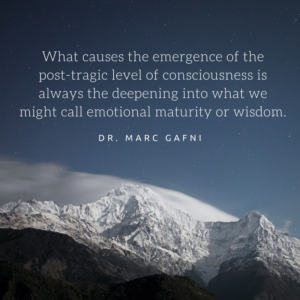From Pre-Tragic to Post-Tragic
 There are three primary levels of consciousness through whose prism we experience our lives. We will call these three levels the pre-tragic, tragic, and post-tragic.
There are three primary levels of consciousness through whose prism we experience our lives. We will call these three levels the pre-tragic, tragic, and post-tragic.
Pre-tragic is the stage before tragedy. Life is good. Life is delightful. Life makes sense. It is ordered and reasonable. The second level of consciousness is the tragic. We suffer. The rules break down. In pre-tragic consciousness everything makes sense. During the pre-tragic state we also experience pain and suffering, but our pain and suffering are not tragic. We are able to explain to ourselves and our intimates what happened. We might use religious, psychological, or scientific explanation. Explanation saves our suffering from being tragic.
The second level of consciousness is the tragic. The goodness of life is broken up by suffering, but we no longer feel able to explain it. Perhaps the suffering is more intense than any we have experienced before. Alternatively, our trust in the religions or philosophies of life that undergirded our explanations has been shaken, often irrevocably. Our lives feel empty and meaningless, “a tale told by an idiot, full of sound and fury, signifying nothing, ” We are overwhelmed by the tragic nature of life itself. We may continue to function, love, and even be highly effective achievers. But our joy mechanism is broken. We are cut off from the natural joy we once felt from the essential goodness and primal aliveness of life.
Most people live their lives at either level one or level two of consciousness, what we have here termed the pre-tragic or the tragic. Some people move from level one to level two as a result of lost trust in life, usually occasioned by a personal tragedy. Others move from pre-tragic to tragic because they are witness to the virtually unbearable suffering in the world. The laws and principles they had used to makes sense of the world seem no longer sensible. Some individuals, after shifting to tragic consciousness, revert back to pre-tragic. This is either because they find some new, comforting explanation for their suffering (based on a superficial reworking of their old beliefs), or because they simply forget their experience of tragedy and fall back into their prior pre-tragic state.
But there is a third level that is available at the leading edge of consciousness. We call this level “post-tragic.” Here, the person or culture is able to once again participate in the elemental joy of living. This happens when the individual (or culture) is able to re-connect to the core Eros and aliveness of reality.
Yeats wrote of this third level, post-tragic consciousness, in the understated but raw Eros of his verse. Here is an example:
When such as I
Cast out remorse
So great a sweetness fills my breast
We can dance and we can sing
We are blest by everything
And everything we look upon
Is blest.
What causes the emergence of this third level of consciousness is always the deepening into what we might call emotional maturity or wisdom. Part of it may come from depth work that the person has done with their own wounds. Another part comes from the maturity of letting go and letting God. Often the source is the evolution of a more poignant and potent worldview. But it always comes from some process of joyful deepening.
From an unedited draft of the book A Return to Eros by Dr. Marc Gafni and Dr. Kristina Kincaid








